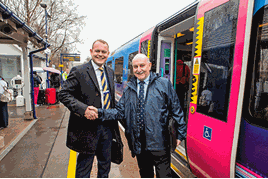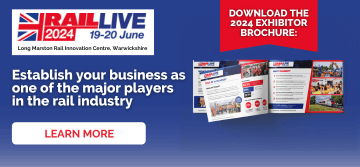These are exciting times for railways in the north of England. New trains have been ordered for two franchises, and through devolution there is now the prospect of decisions being made locally for the benefit of passengers who actually use the railway.
There have been changes, with Northern taking over some routes from TransPennine Express. Both franchises also changed ownership on April 1 - Arriva replaced Abellio and Serco in running Northern, while FirstGroup is now the sole owner of the TPE franchise, having previously operated with Keolis (albeit as the majority owner).
For Arriva, this is the largest franchise it has ever taken on - a clear signal of intent. But what is particularly striking now is the operator’s ambition. Back in 2004, when the Northern Rail franchise began, it was a franchise planned with zero growth and little investment. That has all changed.
Rolling stock has been cascaded to the region. Electrification was approved, and resulted in the start of the North West electrification programme with electric trains running over Chat Moss between Liverpool and Manchester. From late last year they also began running between Manchester and Preston, and there are plans for more routes as the wires are erected.
All this change is proving attractive for those wanting to use the railway for more than just travel. Younger people, who use their electronic devices on the move, are being tempted onto the railway - a trend confirmed last November by the then-Managing Director of Northern Rail, Alex Hynes.
The railways are changing in the North… they have to. The perception (currently) is of Pacers rattling along unloved railways serving stations that are unkempt and unstaffed. The reality is that passenger figures are growing as demand outstrips supply.
Leading the change will be Hynes. He has been installed as MD of the new Northern franchise, and his job is to continue the excellent work that he and his team started with the previous operator and combine that with Arriva’s vision for a new-look Northern railway.
The company is introducing a 37% increase in peak-time capacity, and has revamped ticketing as it seeks to increase the number of weekly services it runs from 16,000 to 18,000.
Arriva plans to spend £1 billion over the next nine years on 281 new carriages, a 12% increase in the number of services, launching the Northern Connect brand, and providing staff at 45 currently unstaffed stations.
Speaking at the launch of the franchise on April 1, Hynes said: “Investment is exactly what customers wanted, and we are looking to achieve major improvements before the end of the decade.”
A few days after the launch, Hynes told RAIL that four big things would revolutionise the franchise: faster trains, new trains, more seats and more services. These will be introduced by December 2019.
The first few days of the franchise had “exceeded expectations”, he says. The re-mapping of the franchises, with Northern taking over some services to the North West from TransPennine Express, had posed some challenges, but these had been overcome quickly and efficiently. A ‘fast fix’ team was established to deal with any issues that arose from the changes.
Hynes explains that the internet will play a big part in the new franchise: “Investing in modern retail is a big part of the bid. We have plans for ticket vending machines. Every station with more than 3,000 passengers will receive one, and we are installing over 200 of them. That will enable us to do penalty fares.”
This is currently not possible, and revenue protection remains a big issue for the operator. Ticketless travel in Yorkshire has dropped from 10% to 5% through investment in equipment, but problems remain. Some stations on routes have ticket machines, but others do not. Only when all origins have a machine can the fight against ticketless travel really begin in earnest. There is no date for their introduction, but it will be before the end of 2019.
December 2019 may be the ultimate target for Hynes, but there will also be some major changes in December next year.
A new timetable will exploit the Ordsall Chord, enabling new direct services such as Bradford-Manchester Airport. At the same time the Preston to Manchester Victoria route will have been electrified. And overall frequency will be stepped up, so that by 2019 a further 2,000 services will have been introduced, with 400 on Sundays alone.
Discussing union claims of job losses, Hynes says: “There are no job cuts envisaged by this franchise. The head count rises, not falls. We are taking on and training hundreds of drivers. There is also no reduction in frontline staff.”
He also wants to modernise the on-board experience for passengers. All trains will have free WiFi and all staff will have a smartphone, enabling them to communicate travel information to passengers more quickly.
As for the Northern Connect operations, he explains: “This is a high-quality inter-urban new network using brand new trains. This is about getting people out of their BMWs, because the current situation is hit and miss regarding what quality they will receive.”
Hynes says that Northern Connect will be a sub-brand, and that it will include not just trains but also the stations. There will be enhanced staffing levels, catering outlets and free WiFi.
“For me, the test is getting the business traveller out of the company car. That is the biggest hurdle,” he says.
An alliance with Network Rail will also be formed. This is a franchise commitment, and will be carried out by July.
Currently Northern operates across two Network Rail routes - London North Eastern and London North Western. The Shaw Report published in February (RAIL 797) suggested that there should be a new Northern route. Hynes says there is no timescale for this, but welcomes the recommendation.
Meanwhile, the benefits of devolution mean that passengers will be able to use services designed and implemented by people based in the region, rather than in London. For example, trains do not run in the North East on January 1, and Hynes wants to change that. He also cites the possibility of running trains on Boxing Day - passengers’ needs have changed in the 21st century, and people want to visit towns and cities that day.
Automatic compensation is another improvement that the franchise is planning. “There will be one for season tickets and the other for advance purchases,” explains Hynes. Commuters will need to nominate a service that they will travel on, in order to claim the cash.
Another expected immediate change will be the quality of the interiors. All trains will undergo a deep clean, while the first refurbished train will enter traffic before the end of the year.
And eight stations will be ‘gated’ in the next year, while stations are to be staffed from before the first train of the day until after the last train of the day.
Hynes has an expectation of the new franchise: “The last one was zero growth. We tore that plan up and put it in the bin where it belonged. There was a 50% customer number increase.
“We introduced electrics between Manchester and Liverpool, and passenger numbers rose 10%. We finished the old franchise with the highest National Rail Passenger Survey standard ever, and above the national standard. Think about what we did with little investment… now think about what we can do with a billion quid.”
Hynes says that the specification of the new franchise attracted him to the new deal: “The specification was great. Arriva’s business plan goes beyond just brand new kit, and that is why I wanted to be here.
“Whitehall sometimes regards subsidy to Northern as a cost, but we provide a lifeline to Whitby, to the workers at Sellafield, and to serve the thousands travelling to Leeds and Manchester each day.”
He notes how on December 26 last year, when the roads around Hebden Bridge flooded, the railway was able to keep running and provide a vital lifeline to the communities. It’s that sort of involvement that Hynes believes is vital. “Northern invented community rail, and the level we invested will double. We will have a dedicated community and sustainability director. Community Rail Partnership lines grow and there is evidence to support that. There are societal and sustainability opportunities available. In this franchise we must work with CRPs to develop services.”
Hynes tells RAIL that four Regional Directors will be recruited, with each responsible for leadership of their region. Their job will be to improve the service in the area.
“For example, Mid-Cheshire wants two trains per hour. The options are either pay for that or use a TOC resource.” He says it will be up to the Regional Directors to look at the best way to meet the needs of the local user groups.
“Rail North and Transport for the North say these TOCs are transformational, but we want to improve business cases to go on. We will act as stewards for the franchise - that is the state of mind.”
He says that Rail North is already talking about changes within the franchise: “Stations is one area. Could they be devolved? There are options in Manchester, and Rail North needs to think about this.
“Can we also talk about extra trains? There are 12 Northern Connect routes. We know what routes 13, 14 and so on could have been, and they could yet make the cut if we want to do more commercial work.”
Hynes is excited by the opportunities afforded to this franchise. His claims that the railways of the North will be better than those in London by 2020 may well be hard to question in four years’ time.
- This feature was published in RAIL 799 on April 27 2016.















Comment as guest
Comments
No comments have been made yet.